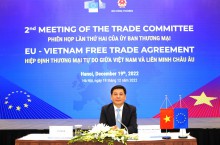The News
Kazakh non-tariff measures and other trade regulations
According to Kazakh law, most products imported into the country must be labeled in both Kazakh and Russian languages. Product labels must include name of the product, manufacturer, country of origin, and date of manufacture, storage conditions, nutrition information, and usage.
According to Kazakh law, most products imported into the country must be labeled in both Kazakh and RuAccording to Kazakh law, most products imported into the country must be labeled in both Kazakh and Russian languages. Product labels must include name of the product, manufacturer, country of origin, and date of manufacture, storage conditions, nutrition information, and usage.
The manufacturer or seller of a certified product has the right to use the valid mark provided by the state technical regulation system.
According to the Eurasian Economic Union (EAEU) Technical Regulations, all products exported into the EAEU - subject to the Compulsory Certification and Regulatory Conformity Assessment - must be labeled in accordance with the Eurasian Conformity regulations (EAC).

In 2019, the government of Kazakhstan added automated agricultural equipment (e.g. tractors…) to the list of items subject to recycling fees. The payment of recycling fees is required for all purchases of imported and domestically produced combine harvester and tractors. However, government subsidies for domestic assemblers of agricultural equipment will offset their recycling fee payments, which creates a non-tariff barrier to trade. Local farmers who recycle equipment are eligible for a discount on the purchase of locally manufactured equipment.
Kazakhstan is a market in the EAEU, which is a market with high sanitary and phytosanitary requirements.
The Kazakh government has made efforts to reform its investment environment. However, this country has not meet criteria in terms of transparency and other important indicators for investors. Kazakhstan ranked 113th out of 180 countries in Transparency International's 2019 Corruption Perceptions Index. According to TI's Global Corruption Schedule, 17% of public service users in Kazakhstan have paid bribes. The government's efforts to improve the investment environment are ongoing under the Business Roadmap 2025 and beyond with the Kazakhstan Strategy 2050, which aims to put the country in the list of 30 most developed countries by 2050.
In the most recent report of the Heritage Foundation, the country was rated as "moderately free" and ranked 39th out of 180 countries, higher than its neighboring China (103) and Russia (94). Kazakhstan's overall score of economic freedom index increased by 4.2 points yoy due to a large increase in financial health scores.
ssian languages. Product labels must include name of the product, manufacturer, country of origin, and date of manufacture, storage conditions, nutrition information, and usage.



